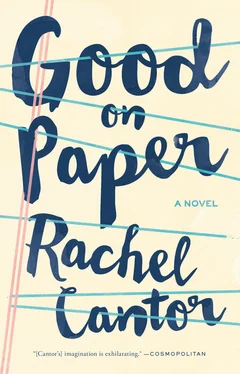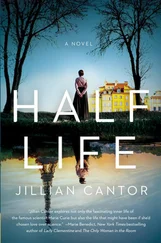Good comedy, but I couldn’t say I got the point.
All this “information” he presents in the form of a detective report, Esther’s version sent over the great sea complete (he says) with eight-by-ten glossies: Shira struggling with groceries, Shira staring at the Hudson. A detective report like the one Janey gets in my story “I Know Who You Are” when she’s looking for Elena, the estranged child of her dead husband. If his wife couldn’t have her child, she’d have a facsimile. This was the elixir he’d offer her: Shira in a bottle.
He used every form he could think of to catch Esther’s attention: a résumé in which I apologize to prospective employers for wasting my life (I work, apparently, in Mobile — i.e., door-to-door — Vacuum Sales, having been fired from a job in Dairy Promotion — i.e., flogging cheese at Zabar’s). I was looking for a job dotting my i ’s and crossing my t ’s.
A To-Do list (call my mother, finish my translation). Alternative endings to my stories scribbled onto a placemat (Elena forgives father, introduces daughter to daughter’s grandmother).
A crossword puzzle, hand-drawn, the clues also referring to my stories. Elena’s comfort: Charly the doll , Mabel’s craving: Devil Dogs . A badly drawn cartoon: Shira using a ruler to rap the knuckles of hapless suitors — a clown, a homeless guy, an old man. The caption: Love hurts .
A whole postmodernist riff, Benny said.
Maybe, I said, but Romei-the-writer seems at loose ends no less than Romei-the-character; his narrative’s reached its edge, his story has broken down.
Romei’s been called the first postmodernist, Benny said, yawning. He’s showing us what he thinks of that.
Maybe, I replied, but I didn’t think so: Romei-the-master was showing me Romei-the-character at the end of his rope.
Esther still does not acknowledge him.
Finally, he sits by a clear stream, which is to say, the East River, hoping for inspiration; it arrives in the form of an ad in the Village Voice : a reading in Alphabet City, the Purple People Eaters’ Writers’ Group. Shira, the daughter, will read.
Oh, I said. The reading that made me a star. From nistar to star!
Romei told me to go, Benny said.
Because he knew I’d be there.
Apparently. I thought he just wanted to meet me there. But after, he raved about your story. I began to think I’d be a fool if I didn’t publish it.
“Confessions”: Young Shira in love with the adulterous T. You didn’t like it?
It was a hard story to hear out loud. Better on paper.
Good recovery, I said, smiling.
Later, when he told me who you were, he made me promise not to say anything.
So Romei is responsible for our having met. Shit.
And your first publication.
Double shit.
You don’t owe him. He had his own agenda.
We wouldn’t be sitting here if it weren’t for Romei, I said.
We’ll invite him to the wedding.
Funny, I said.
You still haven’t given me an answer.
I need time.
Right, Benny said.
Don’t push me.
You thinking about it? Tell me at least you’re weighing the pros and cons.
I am, I said. If he knew my name, that means my mother must have mentioned me, right?
I don’t know, Benny said, and if I did …
I know: you couldn’t say.
He put his arm around me again. I continued.
Romei describes the café where the reading takes place in comical, rhymed verse— English verse, no less . His description made me laugh: he included details about the macrobiotic café I’d forgotten: the morose “maitre d’,” a six-foot Cambodian who liked to ask diners their astrological sign. The larger-than-life posters of Michio Kushi. The organic beer brewed flat by Trixie’s cousin. Described in accurate detail to give authority, I supposed, to what followed. The rest might be fiction, but this scene, we understood, was “real.”
First up on the vegetable crate Trixie called her Soap Box: Franky the funky fabulist. He told pointless tales about street people, paralegals, Israeli electronics salesmen, the moral of which always was that only pre-postmodernist hacks looked for morals in lit-er-a-toor. Romei has fun rhyming Soap with trope, fable with execrable, Franky with spanky (as in, deserves one ).
When Shira climbs onto the Box, with small, hesitant steps, Romei dispenses with doggerel, describes instead a vulnerability that finds expression in tentative gestures, unfinished sentences, a tendency to put hands to face, brown eyes from which gold shines, red dress like a nightgown.
I didn’t tell Benny that to describe me, Romei had recycled language he’d used earlier to describe my mother. As if we were one person. Except for the red dress: Esther had worn a sweater set.
Did I wear a dress like a nightgown? I asked.
Shira, it was a decade ago — how could I remember?
Shira, Romei observes, is shorter than her mother but has her mother’s eyebrows, perpetually arched, her cheekbones, her knees, her hips, her reticent smile. A catalogue of similarities, also of differences: nose, ankles, breasts — apparently, my mother’s were “full,” while mine, in Romei’s expert opinion, were champagne-glass-size. Our characteristics, like building specs, presented in a column.
What is this? I asked.
A Homeric list, Benny said.
He’s pulling out all the stops, isn’t he?
He’s running through all available forms, from light verse to epic, said Benny lazily. I bet you’ve found others.
At least two kinds of sonnets. An aubade, of sorts.
All twisting the form?
Yes!
There’s that Ukrainian villanelle, Benny said. Probably a pastoral, too.
Esther in the park, I said.
Panegyric? he asked, yawning again.
Poems of praise? You could say so! Also twisted.
Actually, Benny said, the whole restaurant scene could be understood as a palinode. A recantation in poetic form of an earlier poem or set of poems.
If he’s recanting his earlier work, what’s he replacing it with?
Hard to say, Benny said, since he’s rejecting all the traditional forms he never used.
Why bother, if only I am to read this?
Maybe he’s making a point. About the need to reject assumptions. I’d have to see the whole thing. You’ll let me read the earlier sections, won’t you?
I nodded and continued. A first-person poem, unrhymed, unmetered, describes Shira on her Soap Box, as she loses her fear, steps closer to the audience. A bright red sloop in the harbor , he writes (again in English), I supposed because Shira’s red dress stood out in that sea of Indian print. I was quite sure I’d never owned a red dress.
Anne Sexton, Benny said. “For My Lover Returning to His Wife.”
I’m reading a story with “confessions” in the title and that makes me a confessional poet? I am not confessional!
Benny raised an eyebrow.
A poem about adultery, I suppose?
The end of it. The end of adultery, I mean.
Ah, I said. Romei was telling me he understood “Confessions” to be a literal account of my life. Strange, since I knew I could no longer read his story that way.
“Song for a Red Nightgown,” Benny said. I remember now. It’s from the same volume as “For My Lover.” Love Poems . I’ll bring it tomorrow.
Terrific, I mumbled. Can’t wait. Shit, I said. We have a copy. Ahmad gave it to Roger, hoping it would prove “an accessible introduction to poetry.” Roger smiled and filed it among Ahmad’s books. Look over there, under S .
Do I have to? Benny asked, wrapping both arms around me now, as if settling in for the night.
Читать дальше












